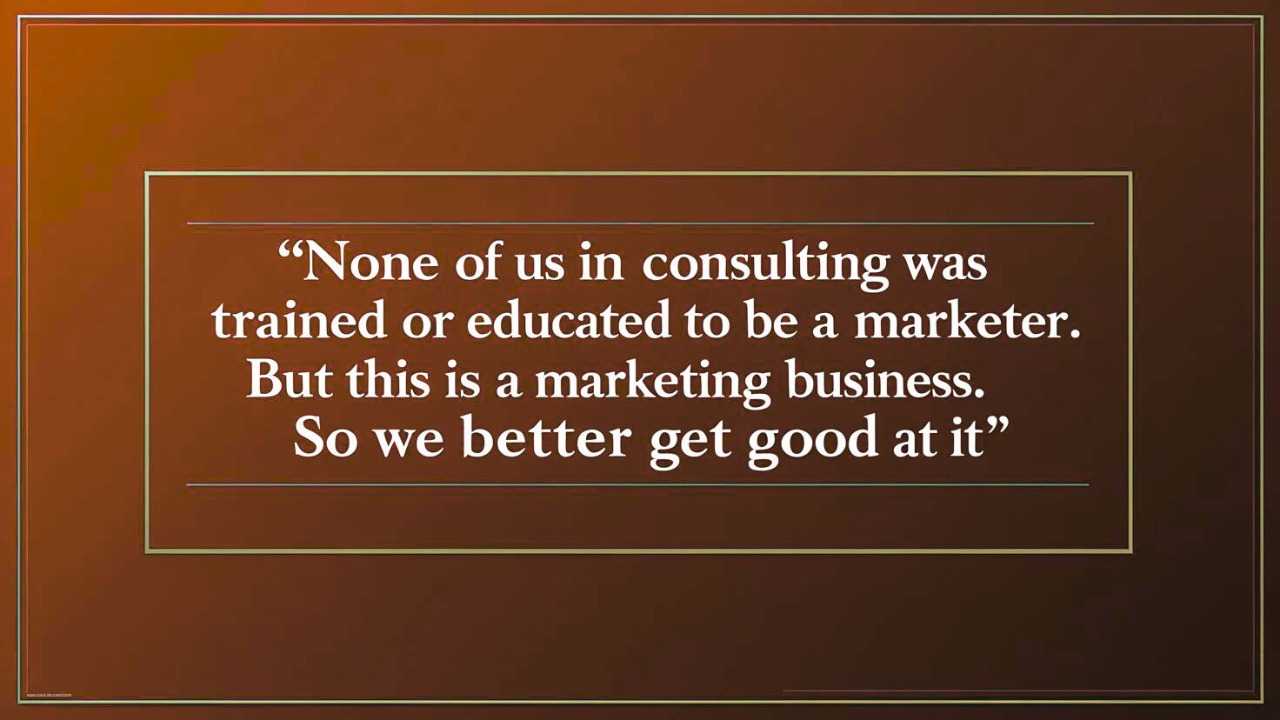Why Your Brilliant Consulting Skills Aren't Enough (And What to Do About It)
Jul 26, 2025
Picture this: You're incredibly good at what you do. Your clients rave about your work. You've transformed businesses, solved complex problems, and delivered results that would make any consultant proud. Yet here you are, staring at your bank account, wondering where next month's rent money is coming from.
Sound familiar?
If you're nodding along, you're not alone. Thousands of brilliant consultants are stuck in this exact same frustrating cycle—feast or famine, scrambling for the next client, trying every marketing tactic under the sun without anything sticking. The cruel irony? Your expertise isn't the problem. Your marketing is.
Alan Weiss, widely known as "The Million Dollar Consultant" and "The Rock Star of Consulting", wisely said: "None of us in consulting was trained or educated to be a marketer. But this is a marketing business. So we better get good at it."
This is the hard truth that too many consultants resist: you are in the marketing business, whether you like it or not. You can be the most brilliant consultant in the world, but if no one knows about you, you'll starve. Marketing isn't a side activity you do when you have spare time—it's core to your success, as fundamental as the actual consulting work itself.
The Identity Crisis Every Consultant Faces
Let's be honest about what's really happening here. You probably got into consulting because you're genuinely passionate about helping businesses solve problems. You love the analytical thinking, the strategic planning, the satisfaction of seeing a client's operations transform under your guidance. Marketing feels... different. Maybe even dirty.
You've likely tried the usual suspects: LinkedIn posting, networking events, cold email campaigns, maybe even some paid advertising. You've probably invested in courses, templates, and systems that promised to be the magic bullet for consistent lead generation. Yet despite all this effort, you're still riding the rollercoaster of unpredictable income.
The problem isn't that you're bad at marketing—it's that you're approaching it all wrong.
Most consultants treat marketing like a necessary evil, something to check off their to-do list. They focus on tactics instead of strategy, on broadcasting instead of connecting, on selling instead of serving. They're playing a game they don't understand with rules that constantly change.
But here's what I've learned after working with hundreds of consultants: the best marketing is simply telling the truth about the transformation you provide. It's not about manipulation, sleazy tactics, or trying to be someone you're not. It's about understanding your ideal client so deeply that your marketing feels like a conversation with a friend who truly gets their struggles.
Why Most Marketing Feels Like Shouting Into the Void
When your marketing isn't working, it's usually because you're making one of these common mistakes:
You're talking about yourself instead of your client's problems. Your website probably lists your credentials, your methodology, and your impressive client roster. But your potential clients don't care about any of that—at least not initially. They care about whether you can solve their specific, urgent problem.
You're trying to be everything to everyone. General marketing messages get ignored. When you try to appeal to every possible client, you end up resonating with no one. Your ideal client should read your content and think, "This person is talking directly to me."
You're focusing on features instead of outcomes. You might be great at process optimization or change management, but what your clients really want is to sleep better at night knowing their business is running smoothly. They want peace of mind, competitive advantage, and measurable results.
You're not consistently showing up. Sporadic marketing efforts don't build trust or top-of-mind awareness. Your ideal clients need to see you as the obvious choice when they're ready to hire someone, and that only happens through consistent, valuable communication over time.
The Mindset Shift That Changes Everything
Great marketing starts with empathy, not ego. It's about leading with the problems you solve, not the credentials you have. It's about creating demand and desire for your services while removing doubt. When you nail your messaging, marketing doesn't feel like marketing—it feels like service.
Think about the last time you hired a consultant or service provider. You probably didn't choose them because they had the most impressive resume or the longest list of certifications. You chose them because they understood your situation, spoke your language, and made you feel confident they could deliver the specific results you needed.
This is exactly how your ideal clients want to feel about you.
The consultants who escape the feast-or-famine cycle understand something crucial: people don't buy consulting services—they buy better outcomes for their business and peace of mind for themselves. Your job isn't to convince them you're smart (they can see that from your work). Your job is to help them see how much better their world will be after working with you.
Three Actionable Strategies to Transform Your Marketing
1. Master the Art of Problem-Focused Messaging
Stop leading with what you do and start leading with what keeps your ideal clients awake at 3 AM. Your marketing should immediately identify the specific problem you solve, not the general service you provide.
Instead of "I help companies with digital transformation," try "I help mid-size manufacturing companies eliminate the operational chaos that's costing them 20% of their revenue every year."
Here's how to develop this messaging: Interview five of your best past clients and ask them to describe their situation before they hired you. What words do they use? What emotions come up? What was the business impact of not solving the problem? Use their language, not consultant-speak.
Create content that addresses these problems head-on. Write about the hidden costs of delayed decisions, the ripple effects of operational inefficiencies, or the competitive risks of maintaining the status quo. When someone with that exact problem finds your content, they should feel like you're reading their mind.
2. Build Your "Obvious Expert" Platform
Consistent thought leadership isn't about posting motivational quotes on LinkedIn or sharing generic business tips. It's about becoming the go-to person for insights on the specific problems you solve.
Choose one primary platform where your ideal clients spend time—whether that's LinkedIn, industry publications, or specialized forums. Then commit to sharing valuable insights consistently. This might mean writing weekly articles about trends in your industry, commenting thoughtfully on relevant discussions, or sharing case studies (with client permission) that demonstrate your approach.
The key is consistency and specificity. Instead of posting about general business advice, focus on the nuanced challenges within your area of expertise. If you help companies with supply chain optimization, write about emerging supply chain risks, efficiency benchmarks, or implementation frameworks. Your ideal clients should start to recognize your name and associate it with valuable insights.
3. Transform Your Sales Conversations
Sales isn't about convincing someone to buy something they don't want. It's about helping the right people recognize that you have exactly what they need. When you approach sales from a place of service rather than desperation, everything changes.
Before any sales conversation, do your homework. Research the company, understand their industry challenges, and prepare thoughtful questions about their specific situation. Your goal isn't to pitch your services—it's to diagnose whether you can genuinely help them and, if so, what that help would look like.
Start every sales conversation by exploring their current situation: What's working? What isn't? What's the cost of not solving this problem? What have they tried before? What does success look like to them? Only after you deeply understand their situation should you explain how you might be able to help.
This approach accomplishes two things: it positions you as a trusted advisor rather than a salesperson, and it gives you the information you need to present your services in terms of their specific desired outcomes.
The Long Game of Building a Sustainable Practice
Escaping the feast-or-famine cycle isn't about finding one perfect marketing tactic—it's about building systems that consistently generate awareness, trust, and demand for your services. This means thinking beyond individual projects to build lasting relationships with clients who see you as their go-to advisor for ongoing challenges.
The consultants who build six and seven-figure practices understand that marketing is a long-term investment, not a short-term fix. They show up consistently, they build genuine relationships, and they focus on serving their ideal clients so well that referrals become inevitable.
They also understand that great marketing amplifies great work, but it can't compensate for mediocre delivery. Your reputation—built through consistently excellent client outcomes—is your most powerful marketing asset.
Your Next Steps
If you're tired of the feast-or-famine cycle, start with one simple commitment: for the next 90 days, focus your marketing efforts on serving your ideal clients rather than selling to them. Share insights that help them think differently about their challenges. Engage in conversations where you can offer genuine value. Position yourself as someone who truly understands their world.
Remember, you're not trying to convince everyone that you're worth hiring. You're trying to make it easy for the right people to find you when they're ready to solve the problems you're uniquely positioned to address.
The expertise you've spent years developing deserves to be shared with the people who need it most. Stop hiding behind generic marketing messages and start telling the truth about the transformation you provide. Your ideal clients are waiting to hear from you—they just need to be able to find you first.
Marketing your consulting practice doesn't have to feel inauthentic or overwhelming. When you approach it as an extension of your service rather than a separate activity, everything becomes clearer. Focus on serving your ideal clients through your marketing, and the sales will follow naturally.
The feast-or-famine cycle doesn't have to be your reality. With the right approach to marketing—one built on empathy, consistency, and genuine service—you can build the predictable, profitable consulting practice you deserve.
